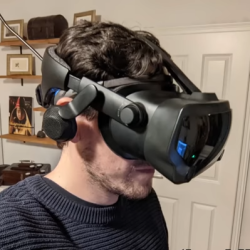[Cangar]’s excitement is palpable in his release of a working brain-computer interface (BCI) mod for Skyrim VR, in which the magic system in the game is modified so that spell effectiveness is significantly boosted when the player is in a focused mental state. [Cangar] isn’t just messing around, either. He’s a neuroscientist whose research focuses on assessing mental states during task performance. Luckily for us, he’s also an enthusiastic VR gamer, and this project of his has several interesting aspects that he’s happy to show off in a couple of videos.

It all starts with the player wearing a Muse 2 meditation device; a type of passive, off-the-shelf electroencephalography (EEG) unit aimed primarily at guiding a user towards better relaxation and focus. [Cangar] reads data using the Brainflow library and processes it into a final value on a scale between “not focused” and “focused”. [Cangar] makes a point of explaining that his system ultimately has the goal of modeling the player’s state of mind, which is different from modeling just the brain activity. As such, motion data is considered as well, and holding still confers a small bonus to the process.
How is this data actually used in the game? In VR, this “focus” value is shown as a small bar on the player’s wrist, and spell effectiveness (for example, damage for attack spells) scales along with the size of the bar. When the bar is full a player would be very powerful, with spells doing double damage. If the bar is empty, spells will do little to no damage.
[Cangar] demonstrates the mod in two videos (both embedded below), but you won’t see him blasting enemies with fireballs. Presumably, VR gamers already know what that looks like, so what he does instead is explain how the system looks and works (first video, cued to 4:12), and in the second, he video demonstrates how the focus meter changes depending on his activity and mental state.
The results look exciting, and the potential uses of a system like this are pretty interesting to think about. Taking a few deep breaths and calming one’s body and mind before launching a magical attack will have a tangible effect in the world, and because things rarely go according to plan, there is also a clear survival benefit to learning to focus while under pressure. But if a brain monitor isn’t your cup of tea, maybe consider a leisurely bike ride through Skyrim, instead.
















Actually kinda cool. Someone should try set this up at a event, then we can test if we are suited to being mages. :)
*at an event
https://dictionary.cambridge.org/de/grammatik/britisch-grammatik/a-an-and-the
😁
Try it in a survival horror game.
When you are panicking, your movement is wobbly and you can’t run straight and can’t turn and aim accurately.
But controlling your state of mind increases accuracy and performance in combat.
It can be applied to combat sim in VR maybe, because soldiers tend to know its a simulation so they might let their guard down and still do well.
But if the system accounts for their “slacking off” mentally then their performance suffers.
These eeg things can be found pretty cheaply if you’re willing to look around a bit. There are even a few development kits out there. I was experimenting using an eeg reader to control a few simple games about eight years ago, after inspiration at a trade show, the eeg was about £30 back then and came with languages for various libraries, but it felt a bit gimmicky and it took too long for the average user to get the hang of using, it would work for me but others seemed to struggle. I think the best game I made for it was a clone of one designed for pigs. Literally the aim was to move a dot into a randomly placed rectangle, that decreased in size after each successful attempt, so it was a bit like a 2D claw machine, sadly it didn’t dispense skittles.
Do you have any example of cheap eeg devices that are also proven safe (i.e. galvanic separation, battery operation etc.)? I am also looking for one, but could only find the likes of openBCI which is several hundred only for the ADC. Most commercial ones that one finds on Amazon that are mostly gimmicky with 2-3 electrodes are also quite expensive…
Reminds me of the esoteric finger-pulse reader for the N64 that controlled the speed of a Tetris game based on how calm you were.
There’s DIYable stuff like DOI:10.1109/ISCAS.2012.6271861. The cost of these COTS devices are mostly justifiable by the convenience they provide. No sticky gels on your hair or electrode wires everywhere.
Sounds doable until you have to deal with muscle artifacts (eye blinking, eye moving, jaw clenching etc), and the need of an actual EEG machine ($$$) to validate that your solution has comparable accuracy and not some muscle activity that got amplified
I really enjoy Skyrim in VR. I just started playing with oculus quest 2 via airlink. One recommendation would just be to incorporate an action such as spelling B in the air for fireBall. Orbus uses this mechanic and it’s surprisingly easy to understand and requires a bit of skill to master. It’s harder than it sounds, but it is better than mindlessly mashing a button :) I believe this idea is borrowed from a book called Elantris. Draw a rune to create magic. Again, it should be easy enough to “learn” what you should do… literally put a picture and the text explaining it in the book when you read the spell book. In VR it is interesting to physically move to cast, just as it is interesting to physically move to swing the sword.
Check out the mod “Mage VR” :)
I have been reading about using an eeg to potentially help with abnormal brainwaves in parkinsons and in symptom management. It would be cool to create different games for different brainwave training programs SMR… ext. A easy game would be best.
https://www.ucsf.edu/news/2021/05/420491/brain-wave-recordings-reveal-potential-individualized-parkinsons-treatments
Any advice on how to try impliment this myself would be great!